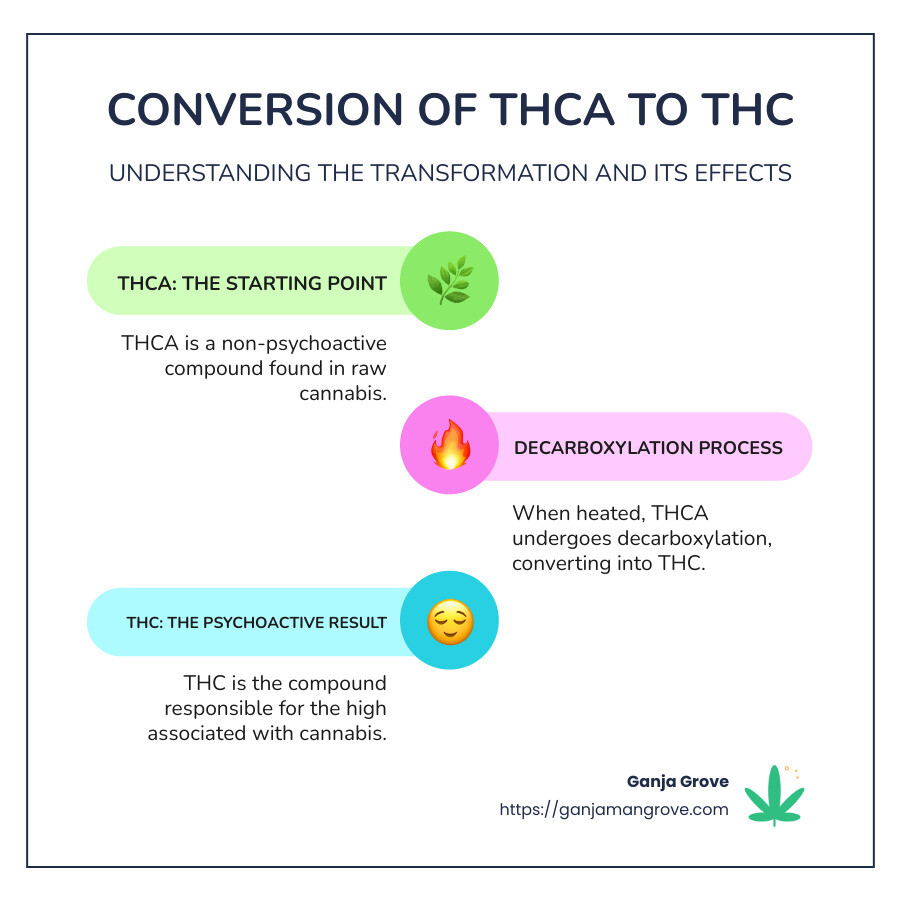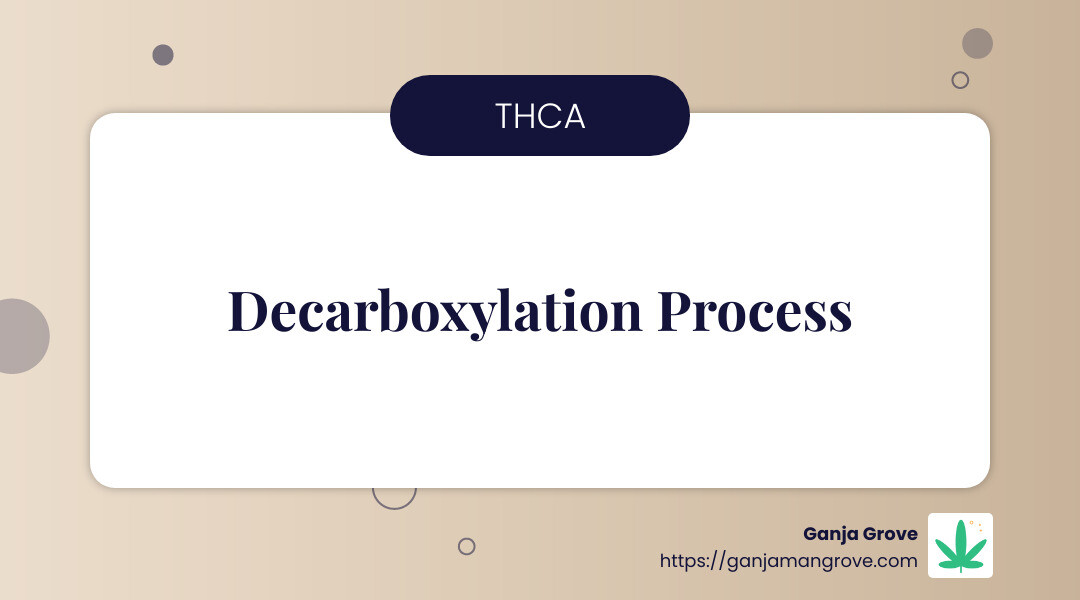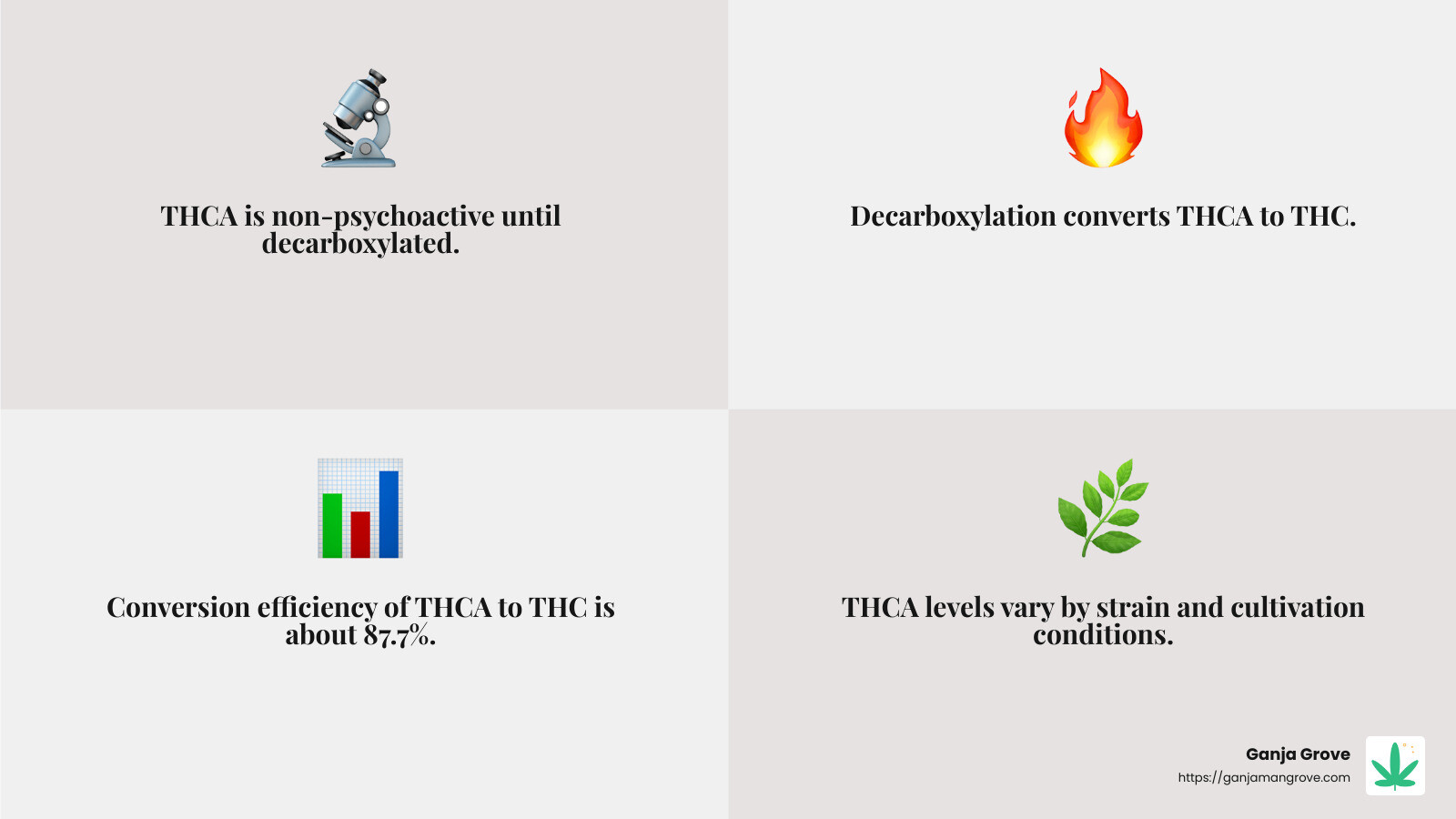How potent is thca? In simple terms, THCA itself isn’t potent in the way THC is, because it doesn’t get you high. But here’s the key: THCA transforms into THC when heated. This process, called decarboxylation, is what brings about the psychoactive effects. So, the potential potency of THCA lies in how much THC it can become when consumed in a way that heats it, like smoking or vaping.
For those exploring cannabis, THCA is a fascinating component. As a non-psychoactive precursor to THC, it offers potential health benefits without the high. Yet, when it’s converted to THC, users experience its full effects. Knowing the percentage of THCA in cannabis products helps predict how potent the result will be after conversion to THC, which is crucial for anyone looking to understand their cannabis experience better.
In recent years, the interest in THCA has surged, not only for its conversion into THC but also for its potential therapeutic benefits. It’s vital to grasp how THCA works and what affects its potency. Entering this field requires knowledge and a keen eye for quality, especially with the burgeoning variety of cannabis options.

Understanding THCA
THCA, or tetrahydrocannabinolic acid, is a compound found in raw cannabis. Unlike THC, it is non-psychoactive, meaning it doesn’t produce a “high.”
Why is THCA important? It serves as the precursor to THC. This means that before THC can exert its well-known effects, it starts as THCA. When cannabis is heated, a process called decarboxylation occurs. This process removes a carboxyl group from THCA, converting it into THC. This conversion is what activates the psychoactive properties of cannabis.

Decarboxylation is crucial for those interested in experiencing the psychoactive effects of cannabis. Without it, consuming raw cannabis won’t produce the typical “high” associated with THC. Instead, you would only ingest THCA, which remains non-psychoactive until heated.
Understanding this change is key for anyone looking to explore cannabis products. It helps in predicting how potent a product will be once consumed in a manner that involves heat, like smoking or vaping. As the cannabis industry evolves, recognizing the role of THCA in the cannabis experience becomes increasingly important for both recreational users and those seeking therapeutic benefits.
How Potent is THCA?
The potency of THCA is a topic that often sparks curiosity. While THCA itself is non-psychoactive, its potential lies in its change into THC, a process that significantly alters its effects.
THCA Percentage and Conversion to THC
THCA is the precursor to THC, and its potency is often gauged by the percentage present in a cannabis strain. A high THCA percentage is typically considered to be 15% or more. This percentage indicates the potential for a strong psychoactive experience once the THCA is converted to THC through decarboxylation.
When THCA is exposed to heat, such as during smoking or vaping, it undergoes decarboxylation. This process converts THCA into THC, activating its psychoactive properties. However, it’s crucial to understand that not all THCA converts to THC. The conversion efficiency is approximately 87.7%, which means that if a strain has 20% THCA, it could potentially yield about 17.54% THC.
Potency Factors
The potency of THCA is influenced by several factors, including the strain’s genetic makeup and how the cannabis is processed and consumed. Various strains have different THCA levels, and factors such as cultivation conditions and harvesting techniques can impact these levels.

Additionally, the method of consumption plays a critical role. Smoking or vaping cannabis leads to almost immediate decarboxylation, thus maximizing the conversion of THCA to THC. Conversely, consuming raw cannabis, such as in smoothies or salads, will not provide the psychoactive effects since decarboxylation does not occur.
Understanding Potency
Understanding how potent THCA is requires a grasp of these conversion dynamics. It’s not just about the initial THCA content but also how effectively it can be transformed into THC. This understanding is pivotal for consumers seeking specific outcomes from their cannabis products.
As you explore different cannabis strains, being aware of the THCA to THC conversion can help you make informed choices about the potency and effects you desire.
Determining THCA Content
Understanding the THCA content in cannabis products is essential for gauging their potential potency. Here’s how you can determine it effectively.
Lab Analysis
Lab analysis is the gold standard for measuring THCA content. Reputable labs use advanced techniques like high-performance liquid chromatography (HPLC) to assess the cannabinoid profile of cannabis products. This method is precise and can separate THCA from other cannabinoids, ensuring accurate results.
Lab results should always be provided by third-party laboratories. This ensures that the data is unbiased and reliable. When purchasing cannabis, always look for products that come with a detailed lab report.
Cannabinoid Profile
A cannabinoid profile gives a snapshot of all the cannabinoids present in a cannabis strain, not just THCA. This profile helps consumers understand the potential effects and potency of the product.
For example, a strain with a high THCA percentage but low levels of other cannabinoids might offer a different experience compared to a strain with a more balanced profile. Understanding the full cannabinoid profile can guide users in selecting strains that align with their desired effects.
Reputable Sources
Purchasing from reputable sources is crucial for obtaining accurate THCA content information. Trustworthy dispensaries and retailers should provide access to lab-tested products and transparent cannabinoid profiles.
Brands like Black Tie CBD are known for their commitment to quality and transparency, offering products with detailed lab analyses. Always verify the credibility of the source before purchasing cannabis to ensure you’re getting what you expect in terms of potency and safety.
By focusing on lab analysis, understanding the cannabinoid profile, and buying from reputable sources, you can confidently determine the THCA content in your cannabis products. This knowledge empowers you to make informed decisions about the potency and effects you seek.
High-THCA Strains
When it comes to high-THCA strains, three names stand out: Blood Diamond, Jetfuel, and Purple Punch. Each offers a unique experience, combining impressive THCA percentages with distinct flavors and effects.
Blood Diamond
Blood Diamond is celebrated for its remarkable THCA content, boasting an impressive 25.4% THCA. This makes it one of the most potent strains available. The strain features a forest of translucent crystals, which contribute to its aesthetic appeal and potency.
Blood Diamond is not just about numbers; it’s about quality, too. The strain is rich in terpenes and flavonoids, enhancing its overall profile. This combination of potency and quality makes Blood Diamond a top choice for those seeking an intense THCA experience.
Jetfuel
Jetfuel is another powerhouse in THCA strains, with 24.7% THCA. Known for its ability to lift the mind, this strain combines the famous Sour Diesel and OG Kush lineages. The result is a balanced terpene profile that amplifies its potency.
Jetfuel doesn’t just rely on its high THCA content; it also boasts a total cannabinoid count of 29.3%, slightly surpassing Blood Diamond in this regard. This makes Jetfuel a well-rounded option for those looking for both potency and a rich cannabinoid profile.
Purple Punch
For those who appreciate a bit of flair, Purple Punch offers 23.2% THCA. This strain is known for its vibrant colors and fruity aroma, making it a favorite among cannabis enthusiasts. Despite having a slightly lower THCA percentage than Blood Diamond and Jetfuel, Purple Punch still packs a punch.
The strain is also high in CBG, adding another layer to its cannabinoid profile. This makes Purple Punch a versatile choice for users looking to explore different effects and flavors.
These high-THCA strains—Blood Diamond, Jetfuel, and Purple Punch—demonstrate that potency isn’t just about numbers. It’s about the full experience, from flavor to effects. Each strain offers something unique, catering to different preferences and needs. Whether you’re seeking the highest THCA percentage or a balanced cannabinoid profile, these strains are worth exploring.
The Role of Terpenes and Flavonoids
Terpenes and flavonoids play a crucial role in the potency and overall experience of cannabis strains. While THCA percentage is important, these compounds add depth and complexity to the effects.
Entourage Effect
The entourage effect is a phenomenon where cannabinoids, terpenes, and flavonoids work together to improve the effects of cannabis. When these compounds are combined, they create a synergy that can make a strain feel more potent than its THCA percentage alone would suggest.
For example, the terpene myrcene is known for its relaxing properties and can amplify the calming effects of THCA. Similarly, limonene can uplift mood, enhancing the euphoric experience of cannabis.
Synergy
Synergy between terpenes, flavonoids, and cannabinoids is what sets exceptional strains apart. Strains like Blood Diamond and Jetfuel not only have high THCA content but also a rich terpene profile. This combination results in a more memorable and impactful experience.
This synergy can also influence the therapeutic benefits of a strain. For instance, some terpenes are known for their anti-inflammatory or anti-anxiety properties, which can complement the effects of THCA.
Strain Quality
Strain quality isn’t just about the numbers; it’s about the overall sensory experience. High-quality strains exhibit a vibrant aroma and flavor profile, thanks to their terpene and flavonoid content. Purple Punch, with its fruity aroma, is a great example of how terpenes contribute to strain quality.
When choosing a strain, consider both its THCA percentage and its terpene profile. A well-balanced strain offers a more comprehensive experience, providing not just potency but also a richer, more enjoyable encounter.
Understanding the role of terpenes and flavonoids helps consumers appreciate the full potential of cannabis. It’s not just about how strong a strain is, but how all its components work together to create a unique and powerful experience.
Frequently Asked Questions about THCA Potency
What is considered a high THCA percentage?
A high THCA percentage is generally considered to be around 15% or more. This threshold is important because it indicates a strain’s potential to convert into a potent amount of THC after decarboxylation. When THCA content is above 15%, the strain is likely to produce noticeable effects once it is heated and transformed into THC.
However, THCA content isn’t the only factor that determines a strain’s effectiveness. The overall cannabinoid profile and the presence of terpenes and flavonoids also play significant roles.
Does THCA get you as high as delta 9?
In its raw form, THCA does not cause a high. Yet, when THCA is heated, it converts to delta 9 THC, which is the psychoactive component responsible for the high. This conversion process is what makes THCA potent in terms of its potential to produce intoxicating effects. Once transformed into delta 9 THC, it can indeed get you as high as traditional THC products.
This means that consuming THCA products without heating them will not result in a high; however, once they are smoked or vaporized, the effects are comparable to those of delta-9 THC.
Is 30% THCA strong?
A strain boasting 30% THCA is considered extremely potent, but such high percentages should be approached with caution. In the cannabis industry, claims of THCA content above 25% can sometimes be misleading. It’s crucial to ensure product integrity by purchasing from reputable sources that provide lab-tested results.
Suspiciously high THCA percentages might indicate inaccuracies in labeling or potential tampering. Always check for third-party lab analyses to confirm the cannabinoid content and ensure you’re getting a genuine product.
In summary, while 30% THCA may sound impressive, the overall experience also depends on other factors like the strain’s terpene profile and how the product is consumed.
Conclusion
At Ganja Grove, we believe that understanding cannabis is just as important as enjoying it. Our focus on cannabis education empowers our customers to make informed choices. Whether you’re a seasoned enthusiast or a newcomer, knowing how THCA works can improve your experience.
Cannabis is a complex plant with many components. THCA, for instance, is non-psychoactive until heated. This makes it versatile and opens up different ways to enjoy it. When you shop with us, you’re not just buying a product; you’re gaining knowledge.
Consumer awareness is key in navigating the cannabis world. We encourage everyone to seek out products that are lab-tested and sourced from reputable suppliers. This ensures safety and quality, helping you get the most out of your purchase.
To explore more about THCA and its forms, such as live sugar gummies, visit our THCA Live Sugar Gummies page. At Ganja Grove, we’re committed to guiding you through your cannabis journey with expertise and care.







